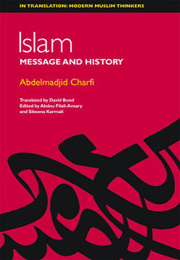1 - History and Theory
from Part One - Characteristics of the Message of Muhammad
Published online by Cambridge University Press: 12 September 2012
Summary
Defining a prophetic message in a general sense is relatively easy; it can be described as the discourse that a prophet communicates to his contemporaries, his community and to people in general. However, the interpretations of prophecy and its content are many and varied. Prophecy and inspiration are among the most difficult terms to deal with, as their meaning changes over time, along with religions and cultures. These terms are also connected with the term “God”, “that mystery which divides us even as it reveals itself and binds us together when it inhabits us”.
The task of defining the term “prophetic message” is rendered more difficult by the fact that it evokes unique historical experiences which cannot be relived at second-hand. The protagonists involved were human, although they were invested with qualities uncommon among ordinary people; qualities which attracted followers and disciples who believed in their message and strove to spread it. They believed in a spontaneous way, and they did not theorise the content of their belief until some time after the proclamation of the prophetic message. As far as the history of Islamic thought is concerned, this theorising took place only in the context of ‘ilm al kalām (theology); it was not an initial concern of the community, more occupied with the political situation than with the rational organisation of the tenets of belief and their content.
For the moment, therefore, the contribution of the theologians has been left aside, in order to re-examine what the history of religions has to say about prophecy and inspiration. Thereafter, close reading of the text of the Qur’an will take us beyond the dense layers of interpretation (which hide as much as they reveal) to uncover the historical reality behind the text. This means reexamining the tales of the Sīra (biography of the Prophet), although we know that they were compiled only after the events that they narrate and that they are a “reading” of history which reflects the writer‘s own situation (Ibn Sa‘ad, Ibn Ishāq, Ibn Hishām, Tabari), as well as the events that befell the Muslim community after the death of the Prophet, notably during the period between the death of the Prophet and the compilation of his biography.
- Type
- Chapter
- Information
- IslamBetween Message and History, pp. 27 - 36Publisher: Edinburgh University PressPrint publication year: 2009



